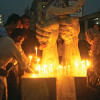A date to remember

April 24 is a date that should not be and cannot be ever obliterated from our memory. We hope that there will not be a repetition of what was the most tragic industrial accident in the country. While we take comfort in the fact that much has been done to obviate the possibility of recurrence of such a catastrophe, we are constrained to ask why it had to take a tragedy like the Rana Plaza to apply the corrective measures. Why is it that our actions have to always be disaster driven? Why could we not have been proactive, which might have saved so many lives in this and other accidents preceding it?
We are happy to see the RMG sector effect many positive changes, becoming more compliant with regard to workers' safety in particular. And this has also been acknowledged by the international community, the buyers in particular. But we feel that there is still more that needs to be done. For example, compliance of subcontracting factories must be ensured. Forty-two percent of the survivors of the Rana Plaza disaster are still jobless who should be provided for. And although much has been done to help the survivors monetarily, physically and psychologically, the authorities should address the issue of compensation as directed by the High Court.
Rana Plaza has become a synonym for everything shoddy and wrong in an industrial unit. Not only the RMG sector but other sectors also involved in production and employing human labour must learn from the tragic event of April 24, 2013. It is our hope too that those responsible for killing nearly 1,200 innocent people will be meted out the punishment they deserve.

 For all latest news, follow The Daily Star's Google News channel.
For all latest news, follow The Daily Star's Google News channel. 







Comments